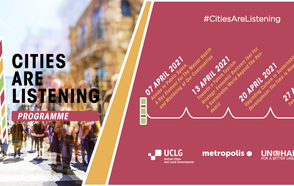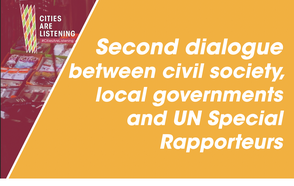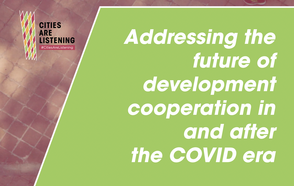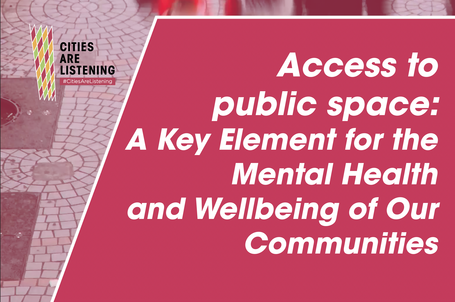
The global impact of the COVID 19 pandemic has affected all facets of public and private lives in various forms. Some of the key preventative measures include physical distancing, restriction of movement, restriction of access to public spaces and enhanced hygiene protocols to name but a few. Whilst these measures are implemented in the interest of public health and wellbeing there are often unintended consequences that come with the limitation of access to public space, in particular mental health and wellbeing of youth children and elderly.
The #CitiesAreListening experience on Public Space and Mental Health, hosted by UCLG, UN-Habitat and Metropolis, together with Placemaking X and powered by UCLG’s Urban Strategic Planning Committee saw local and regional governments and their partners discuss the effects of the pandemic on the mental health of our populations, as well as the importance of public space in the recovery and our relationship to green and public space in the aftermath. Participants also highlighted that public spaces are generators of livelihoods in cities, as spaces to ensure healthy cities beyond the pandemic, and addressed the role these key structuring elements will play in building city resilience post COVID-19.

The Secretary General of UCLG Emilia Saiz introduced the spirit of the CitiesAreListening, by stating the importance of listening to partners and communities as transformative axes of our societies, as well as how the pandemic has revolutionized our priorities and put mental health at the core. She stressed that “the importance of populations’ physical and mental health is becoming a priority for local and regional governments. We need to be honest about our fragilities, and shift priorities defined in the past”.
Setting the scene in a panel moderated by Tollulah Oni, Clinical Senior Research Associate MRC Epidemiology Unit, University of Cambridge, experts on mental health Karen Obrecht, Psychiatrist at New South Wales hospital, Sydney, and on public space Ethan Kent, Placemaking X, addressed the surge in mental health issues throughout the pandemic, calling it a “tsunami of mental illness”, and warning about how it is disproportionately affecting the youth in deprived urban environments. They also addressed the importance of interaction and of building community through public space making activities as an antidote to mental health disorders.
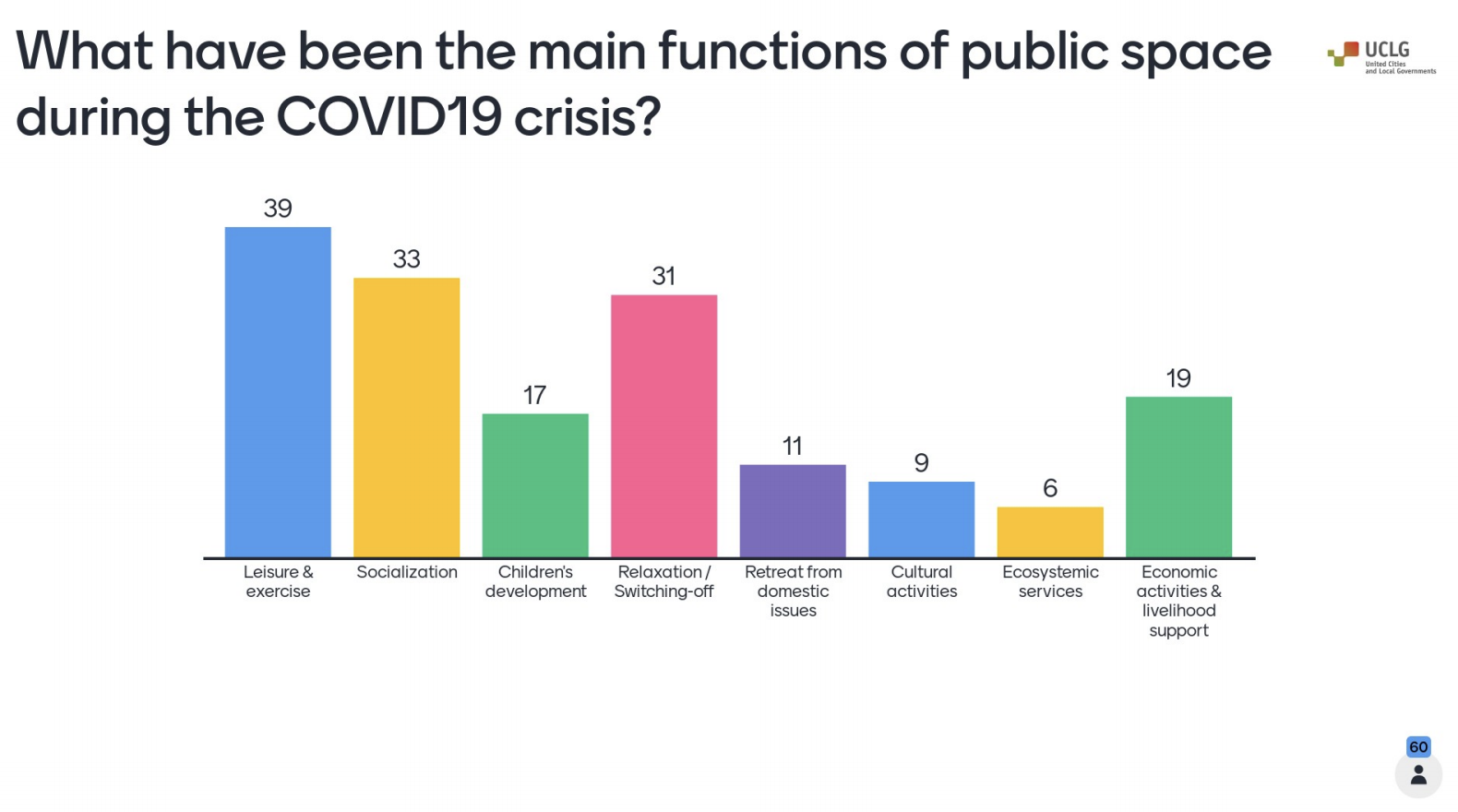
The interactive consultation that followed these complementary keynotes was presented by Puvendra Akkiah, IDP coordinator in Durban and coordinator of the UCG Strategic Urban Planning Committee, who reminded the importance of public space in the work done by the Committee, UN-Habitat and Metropolis over the last year, confirming public space as a a critical lever of change in policy making. Facing the pandemic, this session may guide us to opportunities of action.
Throughout the consultation, participants addressed how local and regional governments could support mental health in their populations by enhancing basic services and facilitate access to green spaces, and also rated what they saw as the main function of public space during the crisis: a space for socialization, leisure, and relaxation to disconnect from the reality of the outbreak rating much higher than the environmental function.
The city panel was introduced and moderated by Jorge Giorno, head of the city strategy office in Buenos Aires, and co - president of the committee of strategic planning. He reminded the power of networking that helps session like this to be immediate , practical and consistent in policy, and in practice.
Cities and regions addressed the relationship between public space and the wellbeing of communities. Claudia Niedzela-Felber, who is leading the social programme of community centres in München, highlighted that teenagers and elderly were groups that suffered psychosocially most due to isolation. For them, she argued, all public spaces are critical, space which is big enough to serve as a meeting point which can be used for getting together without disturbing and without being under permanent control.
Pascal Smet, State Secretary of the Brussels Capital region was highlighting the importance of “spaces where people can meet”, likening public spaces to the living rooms of people’s homes to underscore how central they are for communities, all the while calling for giving public space back to communities and taking it from private transportation and cars.
These points were echoed by Silvia Collin, Councillor of Buenos Aires, who argued that “we need to recover spaces for our communities’ empowerment”, and called to foster the value of closeness to overcome the pandemic.
Paola Andrea Ricardi, Director of Coordination of Equality Policies of La Paz, underscored the importance of tending to mental health to ensure cities of peace and avoid violence. The focus, she said, “needs to be on dialogue and empathy to be able to overcome the pain and anguish that has come with the pandemic”.
The dialogue from cities was followed by the introduction of the “Integrating Health in Urban and Territorial Planning Sourcebook” by Laura Petrella, UN Habitat, Chief, Planning, Finance and Economy Section, who called on the need to “strengthen the interaction between health and urban development and planning to design better public spaces and mental health outcomes”.
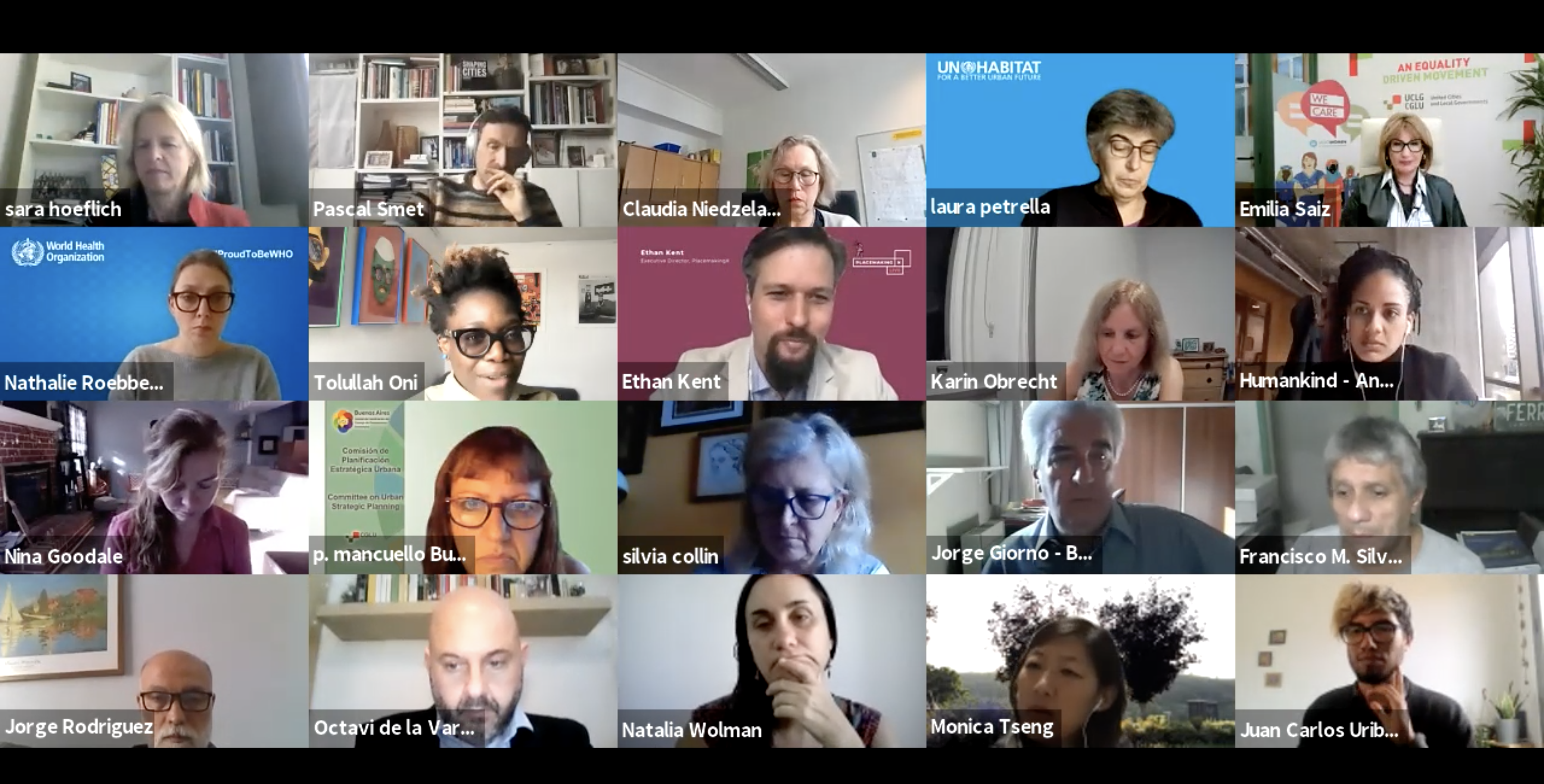
The ensuing conversation between panelists and participants was moderated by Octavi de la Varga, Secretary General of Metropolis, who highlighted how the pandemic had brought the value of public space as a critical space for human interaction, and addressed the work already made by Metropolis on gender approaches to public space, and how we “now have the opportunity to bring the discussion to a different perspective” by addressing the linkages between both agendas. Barbara Holtmann, author of the Safe Communities Initiative of Durban, highlighted the need to link the climate change and public space agenda, and to align them together in a way that brings people together and enhances their agency. Nathalie Roebbel, Coordinator for Air Pollution and Urban Health, WHO, also highlighted the importance of working on the areas of public spaces and mental health in the Global South, analyzing the difference in accessing public space between countries and the need to address, as well, inequalities inside countries and communities in this regard.
Cecilia Andersson, manager of the UN-Habitat Global Public Space Programme, wrapped up the session by calling on the need to bring those partners that are committed to equitable public space together to ensure that it can be enjoyed by all people equally, and commended the inputs shared by participants arguing that they would be integral to feed the renewal of the social contract. Sara Höeflich, director of the UCLG Learning Team, concluded by highlighting how the session could be a starting point for further work and exchange of practices that can inspire each other, not only through learning activities but also further cross-fertilization and local action within the UCLG agenda on peace and health.
Watch the session again here:











